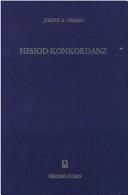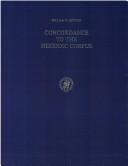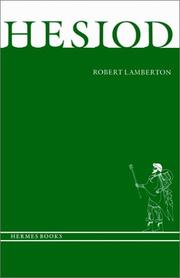| Listing 1 - 10 of 46 | << page >> |
Sort by
|
Book
ISBN: 9788887829365 8887829365 Year: 2008 Publisher: Firenze : Istituto Papirologico "G. Vitelli",
Abstract | Keywords | Export | Availability | Bookmark
 Loading...
Loading...Choose an application
- Reference Manager
- EndNote
- RefWorks (Direct export to RefWorks)

ISBN: 3487062682 9783487062686 Year: 1977 Volume: 34 Publisher: Hildesheim Olms
Abstract | Keywords | Export | Availability | Bookmark
 Loading...
Loading...Choose an application
- Reference Manager
- EndNote
- RefWorks (Direct export to RefWorks)
Classical Greek language --- Classical Greek literature --- Hesiodus --- Hesiod --- Concordances --- Hesiodos --- Concordances. --- Gesiod --- Geziod --- Esiodo --- Hēsiodos --- Hezjod --- Hésiode --- Hesíodo --- Hesiyodos --- הסיודוס --- Ἡσίοδος --- Hésiode --- Hesiod - Concordances

ISBN: 9004043810 Year: 1976 Publisher: Leiden
Abstract | Keywords | Export | Availability | Bookmark
 Loading...
Loading...Choose an application
- Reference Manager
- EndNote
- RefWorks (Direct export to RefWorks)
Classical Greek language --- Classical Greek literature --- Hesiodus --- Greek poetry --- Concordances. --- Hesiod --- Concordances --- Greek literature --- Hesiodos --- Gesiod --- Geziod --- Esiodo --- Hēsiodos --- Hezjod --- Hésiode --- Hesíodo --- Hesiyodos --- הסיודוס --- Ἡσίοδος
Multi
ISSN: 18723357 ISBN: 9789004178403 9004178406 9047440757 9789047440758 Year: 2009 Volume: *4 Publisher: Leiden ; Boston : Brill,
Abstract | Keywords | Export | Availability | Bookmark
 Loading...
Loading...Choose an application
- Reference Manager
- EndNote
- RefWorks (Direct export to RefWorks)
This is the first full-scale companion on Hesiod to appear in English. The twelve contributions included in this volume cover a wide range of aspects of Hesiodic poetry, such as the relation between Hesiod and the literary traditions of the Near East and the entire span of works comprising the Hesiodic corpus, from the Theogony and the Works and Days to the Melampodia and the Aigimios. They also explore the language, style, poetics, and narrative art of Hesiod, as well as his influence on Hellenistic and Roman poetry, but also his reception by the ancient biographical traditions and scholia. The aim of this volume is to supply all those interested in Greek poetry with an up-to-date and comprehensive overview of scholarly approaches to Hesiod and various other works which have come down to us under his name.
Hesiod --- Criticism and interpretation. --- Historiae (Thucydides) --- Criticism and interpretation --- Hésiode --- Hesiodos --- Hesiodus --- Gesiod --- Geziod --- Esiodo --- Hēsiodos --- Hezjod --- Hésiode --- Hesíodo --- Hesiyodos --- הסיודוס --- Ἡσίοδος --- Hesiod. --- Hesiod - Criticism and interpretation

ISBN: 0300040687 0300040695 Year: 1988 Publisher: New Haven : Yale University Press,
Abstract | Keywords | Export | Availability | Bookmark
 Loading...
Loading...Choose an application
- Reference Manager
- EndNote
- RefWorks (Direct export to RefWorks)
Mythology, Greek, in literature. --- Hesiod --- Criticism and interpretation. --- 875 HESIODUS --- Griekse literatuur--HESIODUS --- 875 HESIODUS Griekse literatuur--HESIODUS --- Mythology, Greek, in literature --- Hesiodos --- Hesiodus --- Gesiod --- Geziod --- Esiodo --- Hēsiodos --- Hezjod --- Hésiode --- Hesíodo --- Hesiyodos --- הסיודוס --- Ἡσίοδος
Book
ISBN: 9780674997202 9780674997219 0674997204 0674997212 Year: 2018 Volume: 57, 503 1-2 Publisher: Cambridge, Massachusetts : Harvard University Press,
Abstract | Keywords | Export | Availability | Bookmark
 Loading...
Loading...Choose an application
- Reference Manager
- EndNote
- RefWorks (Direct export to RefWorks)
"The second volume contains The Shield and extant fragments of other poems, including the Catalogue of Women, that were attributed to Hesiod in antiquity. The former provides a Heiodic counterpoint to the shield of Achilles in the Iliad; the latter presents several legendary episodes organized according to the genealogy of their heroes' mortal mothers. None of these is now thought to be by Hesiod himself, but all have considerable literary and historical interest" --Book jacket.
Greek poetry. --- Mythology, Greek --- Hesiod --- Greek poetry --- Hesiod. --- Gesiod --- Geziod --- Esiodo --- Hēsiodos --- Hezjod --- Hésiode --- Hesíodo --- Hesiyodos --- הסיודוס --- Ἡσίοδος --- Translations into English. --- Hésiode, --- Hésiode --- Greek poetry - Translations into English
Book
ISBN: 9780190209032 0190209038 Year: 2018 Publisher: New York, NY : Oxford University Press,
Abstract | Keywords | Export | Availability | Bookmark
 Loading...
Loading...Choose an application
- Reference Manager
- EndNote
- RefWorks (Direct export to RefWorks)
Book
ISBN: 1283039419 9786613039415 9004189815 9789004189812 9781283039413 9789004186163 9004186166 6613039411 Year: 2010 Publisher: Leiden Boston
Abstract | Keywords | Export | Availability | Bookmark
 Loading...
Loading...Choose an application
- Reference Manager
- EndNote
- RefWorks (Direct export to RefWorks)
Hesiod: The Other Poet is a study dealing with the role of Hesiod in the imagination and the collective memory of the ancient Greeks. Its main hypothesis is that Hesiod's image was to a large degree formed by the picture of Homer: Hesiod is decidedly different when presented as allied with, opposed to or simply without Homer. Following this approach, Hesiod is investigated as a moral and philosophical authority, a locus informed with values and qualities, a concept in literary-critical discourse, and more generally as a cultural and panhellenic icon constructed and reconstructed by later Greek authors who employed and so re-created him in their own texts.
Memory --- Retention (Psychology) --- Intellect --- Psychology --- Thought and thinking --- Comprehension --- Executive functions (Neuropsychology) --- Mnemonics --- Perseveration (Psychology) --- Reproduction (Psychology) --- Social aspects --- History --- Hesiod --- Gesiod --- Geziod --- Esiodo --- Hēsiodos --- Hezjod --- Hésiode --- Hesíodo --- Hesiyodos --- הסיודוס --- Ἡσίοδος --- Criticism and interpretation. --- Influence.
Book
ISBN: 9780198729549 0198729545 0191796409 Year: 2015 Publisher: London Oxford University Press
Abstract | Keywords | Export | Availability | Bookmark
 Loading...
Loading...Choose an application
- Reference Manager
- EndNote
- RefWorks (Direct export to RefWorks)
Greek poet Hesiod's canonical archaic text, the 'Works and Days', was performed in its entirety, but was also relentlessly excerpted, quoted, and reapplied. In this volume, Lilah Grace Canevaro situates the poem within these two modes of reading and argues that the text itself, through Hesiod's complex mechanism of rendering elements detachable while tethering them to their context for the purposes of the poem, sustains both treatments. One of the poem's difficulties is that Hesiod gives remarkably little advice on how to negotiate these different modes of reading. Canevaro considers the didactic methods employed by Hesiod from two perspectives: in terms of the gaps he leaves, and of how he challenges his audience to fill them. She argues that Hesiod's reticence is linked to the high value he places on self-sufficiency, which creates a productive tension with the didactic thrust of the poem as teaching always involves a relationship of exchange and, at least up to a point, reliance and trust. Hesiod negotiates this potential contradiction by advocating not blind adherence to his teachings but thinking for oneself and working for one's lesson. Exploring key issues such as gender and genre, and persona and performance, this volume places this important poem within a wider context, revealing how it draws on and contributes to a tradition of usefulness.
Didactic poetry, Greek --- Mythology, Greek, in literature. --- Didactic poetry, Greek. --- Influence (Literary, artistic, etc.) --- Grekisk mytologi i litteraturen. --- Influenser. --- History and criticism. --- Hesiod. --- Hesiod --- Hesiodos, --- Criticism and interpretation. --- Influence. --- Works and days (Hesiod) --- Influence (Literary, artistic, etc.). --- Works and days (Hesiod). --- Hesiodus. --- Gesiod --- Geziod --- Esiodo --- Hēsiodos --- Hezjod --- Hésiode --- Hesíodo --- Hesiyodos --- הסיודוס --- Ἡσίοδος
Book
ISBN: 9780190253967 0190253967 9780190253974 0190463848 0190253983 0190253975 9780190463847 Year: 2015 Publisher: Oxford New York, NY Oxford University Press
Abstract | Keywords | Export | Availability | Bookmark
 Loading...
Loading...Choose an application
- Reference Manager
- EndNote
- RefWorks (Direct export to RefWorks)
This study both offers a reading of Hesiod's 'Theogony' and traces the reception and shadows of this authoritative Greek creation story in Greek and Roman texts up to Milton's 'Paradise Lost'. It also considers the poem in light of Near Eastern creation stories, including the 'Enûma Elish' and 'Genesis', as well as Freud's 'Civilization and Its Discontents'. In this book, Hesiod's poem is read as a hymn to Zeus and a city-state creation myth, arguing that Olympus is portrayed as an idealised polity and - with but one exception - a place of communal harmony.
Greek poetry --- Poésie grecque --- History and criticism --- Histoire et critique --- Hesiod. --- Hesiod --- Appreciation. --- Appreciation --- Art appreciation. --- Theogony (Hesiod). --- Hesiod -- Appreciation. --- Hesiod. -- Theogony. --- Languages & Literatures --- Greek & Latin Languages & Literatures --- Gesiod --- Geziod --- Esiodo --- Hēsiodos --- Hezjod --- Hesiodus --- Hésiode --- Hesíodo --- Hesiyodos --- הסיודוס --- Ἡσίοδος --- E-books --- Hesiodos --- Poésie grecque --- Hesiod -- Appreciation --- Hesiod. -- Theogony --- Théogonie --- Hesiod - Theogony --- Hesiod - Appreciation
| Listing 1 - 10 of 46 | << page >> |
Sort by
|

 Search
Search Feedback
Feedback About UniCat
About UniCat  Help
Help News
News